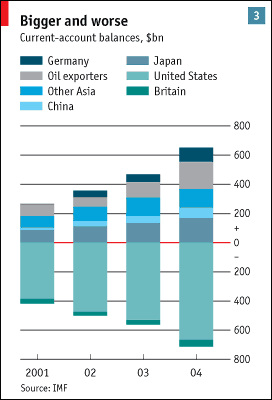IMF worried about the US Fiscal Policy
By Paul

The Japanese Deputy Managing Director of IMF is worried about global imbalances;
"Regarding risks and vulnerabilities, the IMF sees the widening global imbalances as a substantial risk to global growth. The current equilibrium is unstable, as it rests on the capacity of the United States to continue to attract foreign savings. Foreign investors may become unwilling to hold increasing amounts of U.S. financial assets and demand higher interest rates, especially if Asian countries recover from the investment drought that they have experienced since the Asian crisis. A depreciation of the U.S. dollar may be necessary to induce U.S. domestic demand to contract. However, if this or other adjustments occur abruptly, it could cause a slowdown in demand and output, as well as financial market disruptions, at the global level.
Therefore, the IMF has underscored the urgent need to use the current favorable environment to address vulnerabilities arising from growing imbalances. It has repeatedly called for coordinated multilateral policy actions to help bring about a gradual and orderly unwinding of those imbalances—unfortunately, there has been at best a limited progress to date. Action is needed in all the main blocs, including (i) tighter fiscal policy in the U.S.; (ii) greater exchange rate flexibility in Asia; and (iii) structural reforms to improve productivity and medium-term fiscal sustainability in Europe and Japan. High and volatile oil prices are likely to complicate the adjustment, so IMF advice has focused on the appropriate policy response."
Mankiw, author of most popular economics principles textbook, in his resignation letter from the Chairman of the Council of Economic Advisors praises the fiscal policy of the administration he served;
“Your leadership has preserved and strengthened the American dream by guiding the economy through difficult times and by laying the foundation for a growing and expanding prosperity. You appreciate the power of economic liberty and have worked to create an environment where all Americans can realize the potential with which their creator has endowed them. You understand that free enterprise system works best under a policy of low taxes, fiscal discipline, and open markets…”
Related Links:
- Examining Global Imbalances
- Perspectives on Global Imbalances
- Global Imbalances: A Saving and Investment Perspective
- Latest US Article IV consultation report and Selected Issues
- The Global Saving Glut and the U.S. Current Account Deficit, Ben Bernanke speech
- The Unsustainability of U.S. Trade Deficits, John Quiggin
- Divergent Views on the Coming Dollar Crisis, Bradford DeLong
- Outlook for the Global Economy, Robert Rubin (podcast)
Comments